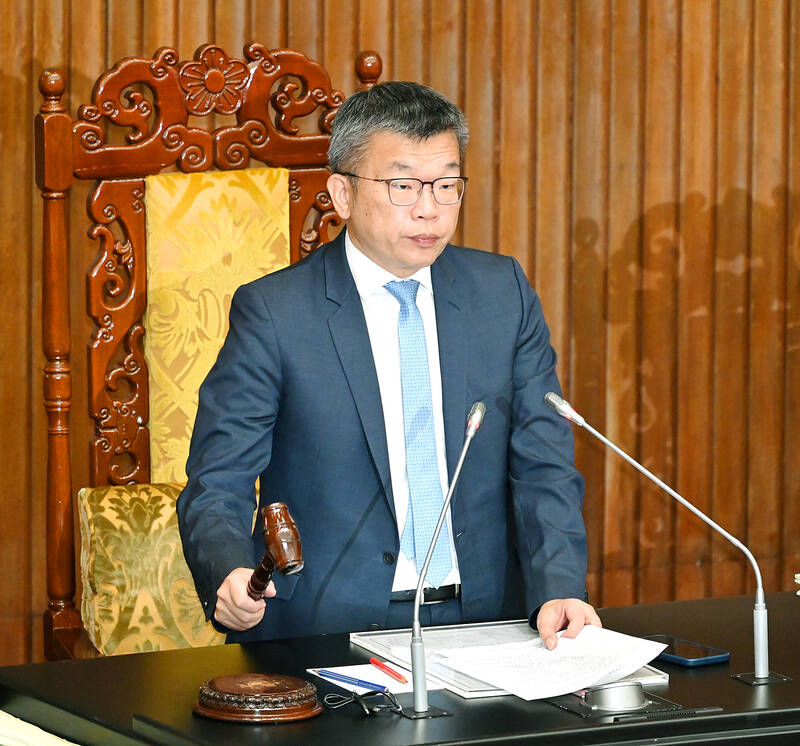Import tax for quartz glass products used in the semiconductor industry is to be lowered to 1.2 percent after the Legislative Yuan yesterday passed the third reading of an amendment to the Customs Import Tariff Act (海關進口稅則).
The Ministry of Finance last year proposed the amendment to ensure that the categories listed in the act align with last year’s edition of the Harmonized Commodity Description and Coding System published by the World Customs Organization. The bill was approved by Executive Yuan on Aug. 11 last year.
Quartz glass products used in the semiconductor industry are imported in many forms and can be classified under different tariff codes under current regulations, resulting in a range of applicable tax rates, the finance ministry said.

Photo: Liu Hsin-de, Taipei Times
For example, the import tax for glass balls, glass rods and glass tubes is set at 1.2 percent, while the tax for quartz crucibles used in the manufacture of semiconductors is 5 percent and that for other industrial glassware is 10 percent, the ministry said.
The amendment sets tax rules for quartz glass products exclusively used in the semiconductor industry and stipulates additional regulations, the ministry said.
If a quartz glass product is certified by the Ministry of Economic Affairs as for use in the semiconductor industry, it is to be taxed a uniform rate of 1.2 percent, meaning some products with import tax of 10 percent could benefit.
The amendment also adjusts the tax classification of squid products by adding four new categories: live, fresh or frozen squid; unsmoked frozen squid; dried, salted or soaked but unsmoked squid; and smoked squid.
The tax rates were set in accordance with the norms of the WTO, the ministry said.
The amendment would help expedite trade negotiations with other countries, the Executive Yuan said.
An amendment to the Social Worker Act (社會工作師法) was also passed by the legislature.
It bans those who have been found guilty of contravening the Sexual Assault Crime Prevention Act (性侵害犯罪防治法), Sexual Harassment Prevention Act (性騷擾防治法) or Child and Youth Sexual Exploitation Prevention Act (兒童及少年性剝削防制條例) from becoming social workers.

Chinese Nationalist Party (KMT) Chairman Eric Chu (朱立倫), spokeswoman Yang Chih-yu (楊智伃) and Legislator Hsieh Lung-chieh (謝龍介) would be summoned by police for questioning for leading an illegal assembly on Thursday evening last week, Minister of the Interior Liu Shyh-fang (劉世芳) said today. The three KMT officials led an assembly outside the Taipei City Prosecutors’ Office, a restricted area where public assembly is not allowed, protesting the questioning of several KMT staff and searches of KMT headquarters and offices in a recall petition forgery case. Chu, Yang and Hsieh are all suspected of contravening the Assembly and Parade Act (集會遊行法) by holding

PRAISE: Japanese visitor Takashi Kubota said the Taiwanese temple architecture images showcased in the AI Art Gallery were the most impressive displays he saw Taiwan does not have an official pavilion at the World Expo in Osaka, Japan, because of its diplomatic predicament, but the government-backed Tech World pavilion is drawing interest with its unique recreations of works by Taiwanese artists. The pavilion features an artificial intelligence (AI)-based art gallery showcasing works of famous Taiwanese artists from the Japanese colonial period using innovative technologies. Among its main simulated displays are Eastern gouache paintings by Chen Chin (陳進), Lin Yu-shan (林玉山) and Kuo Hsueh-hu (郭雪湖), who were the three young Taiwanese painters selected for the East Asian Painting exhibition in 1927. Gouache is a water-based

Taiwan would welcome the return of Honduras as a diplomatic ally if its next president decides to make such a move, Minister of Foreign Affairs Lin Chia-lung (林佳龍) said yesterday. “Of course, we would welcome Honduras if they want to restore diplomatic ties with Taiwan after their elections,” Lin said at a meeting of the legislature’s Foreign Affairs and National Defense Committee, when asked to comment on statements made by two of the three Honduran presidential candidates during the presidential campaign in the Central American country. Taiwan is paying close attention to the region as a whole in the wake of a

OFF-TARGET: More than 30,000 participants were expected to take part in the Games next month, but only 6,550 foreign and 19,400 Taiwanese athletes have registered Taipei city councilors yesterday blasted the organizers of next month’s World Masters Games over sudden timetable and venue changes, which they said have caused thousands of participants to back out of the international sporting event, among other organizational issues. They also cited visa delays and political interference by China as reasons many foreign athletes are requesting refunds for the event, to be held from May 17 to 30. Jointly organized by the Taipei and New Taipei City governments, the games have been rocked by numerous controversies since preparations began in 2020. Taipei City Councilor Lin Yen-feng (林延鳳) said yesterday that new measures by